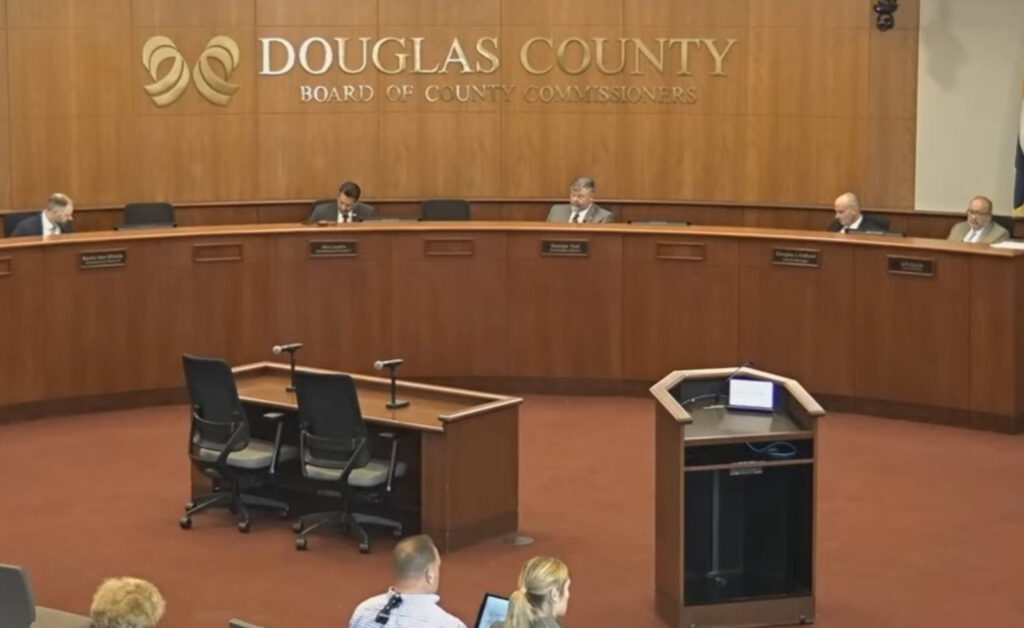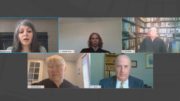By Jeffrey A. Roberts
CFOIC Executive Director
A judge made a “painfully obvious” legal error in ruling last May that the Douglas County Commission did not discuss public business during 14 meetings held outside of public view, three county residents say in a brief filed with the Colorado Court of Appeals.
Douglas County District Court Judge Robert Lung determined that the Colorado Open Meetings Law (COML) did not apply to 11 “advance planning meetings” and three “elected officials” luncheons because the court “heard no evidence” those meetings related to the commissioners’ policy-making function.

Finding that Robert Marshall, Lora Thomas and Julie Gooden were “not reasonably likely to succeed on the merits” of their open meetings law case, Lung declined to issue a preliminary injunction that would have halted an ultimately unsuccessful June special election to make Douglas County a home rule county.
But there is “undisputed evidence” the commissioners discussed the home rule initiative during the challenged meetings as well as whom to appoint to county boards and commissions, a resolution on immigration, the cost of conducting a formal survey of county residents and whether to change public comment rules, the residents told the Court of Appeals in a recent brief.
“The District Court’s legal conclusion was erroneous: numerous topics of the Board’s ‘public business’ — meaning matters that bore a meaningful connection to the policy-making functions of the Board — were discussed in the course of those meetings,” the brief says. “Thus, those closed-door meetings violated the COML.”
Marshall is a Democratic state representative from Highlands Ranch, Thomas a former Republican county commissioner and Gooden an unaffiliated Douglas County voter. The three are represented by First Amendment attorney Steve Zansberg, who cited in the brief case law emphasizing that the “underlying intent” of the open meetings law is to ensure the public is not “deprived of the discussions, the motivations, the policy arguments and other considerations which led to the discretion exercised by” a public body.
“The COML guarantees all Coloradans the right to observe all discussions of ‘public business’ by our public bodies (unless discussed in a properly convened executive session) — even the most preliminary ones — to enable public participation to help shape such policy formulation, rather than merely watching the culmination of that process, a vote or other type of decision,” wrote Zansberg, who is president of the Colorado Freedom of Information Coalition.
The county commissioners, the three plaintiffs allege, met in executive session three times during luncheons last March without complying with the statutory requirements to convene an executive session. The open meetings law requires a public body to convene an executive session during the public portion of a regular or special meeting and announce the “particular matter” to be discussed behind closed doors. The commissioners failed to announce the topic of the executive sessions, and there was no public notice of 11 “completely secret” advance planning meetings held from December to March as required by the COML, the plaintiffs’ brief says.
“The District Court’s legal error is painfully obvious,” it adds. “Colorado’s Supreme Court has made clear that ‘public business’ is any matter upon which a public body is authorized by law (state or federal Constitution, law, or regulation) to take action.”
For a meeting to be subject to the open meetings law, there must be a demonstrated link between the content of the meeting and the policy-making responsibilities of the public body, the Supreme Court decided in Board of County Commissioners of Costilla County v. Costilla County Conservancy District in 2004.
The district court judge ignored evidence that the commissioners, during the elected officials luncheons, discussed a slide presentation describing the process for converting Douglas County into a home rule jurisdiction as well as two resolutions required by the home rule conversion process, Zansberg wrote. As for the various topics discussed at the unnoticed advance planning meetings, “[n]o serious argument can be made that each … do not bear a ‘meaningful relationship’ to the ‘policy making functions’ of the BOCC.”
Douglas County, in an answer brief submitted Nov. 6 by deputy county attorneys Kelly Dunnaway and Andrew Steers, told the Court of Appeals the residents’ appeal is “moot” because voters defeated the home rule resolution. “The election has occurred and there is no evidence in the record of an intention to continue what Plaintiffs allege are COML violations,” they wrote. “Therefore, the Court should dismiss the appeal as moot.”
Marshall, Thomas and Gooden “never presented evidence that any policy discussion took place” during the challenged meetings, the county’s brief says. “Rather, Plaintiffs are asking this Court to look beyond their own failure to prove their case and make a legal determination that they never had to present evidence.”
Follow the Colorado Freedom of Information Coalition on X (formerly Twitter) @CoFOIC. Like CFOIC’s Facebook page. Do you appreciate the information and resources provided by CFOIC? Please consider making a tax-deductible donation.




